

PopEntertainment.com >
Feature
Interviews - Actresses >
Feature Interviews K to O > Jessica Lange
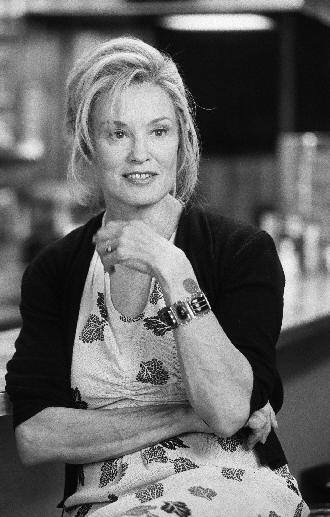 Jessica Lange
Jessica Lange
Don’t Go Changing
By Jay S. Jacobs
Copyright ©2006 PopEntertainment.com. All rights reserved.
Posted:
March 17, 2006.
It’s
hard to believe after spending all of these years as one of America’s
premier
actresses, but when Jessica Lange started out, she was that rarest of
creatures – a model who could actually act. In the early seventies she
graced magazine covers and perfume ads, but Lange never
liked posing, it was only a step on the ladder
for Lange.
Of
course her acting career had a bit of a rocky start. She was hired as the
female lead of producer Dino DiLaurentiis’ 1976 big-bucks remake of King
Kong. That movie was pounded by the critics and some of the toughest
knocks were reserved for the young starlet.
Ironically, the film is so far in the past with Lange that she is merely
bemused by it. In fact, when she hears mention of the new 2006 version of
the classic ape story, she good naturedly dismisses it. “I didn’t see it,”
she says laughing. “I really don’t [have any desire to]. I have no curiosity
about it.”
She
did not work again for three years, when director/choreographer Bob Fosse
took a chance on her in the splashy supporting role as
the mysterious muse in
his classic semi-autobiographical film All That Jazz. Jessica Lange
hasn’t looked back since, she has since become respected
enough to be lumped in with Streep, Keaton, Spacek and
Field as the best actresses of her generation.
Lange’s ascendance was complete in 1982, when she received two Oscar
nominations. Lange was up for Best Actress for her portrayal
of tragic actress Frances Farmer in
Frances.
She also was nominated
that same year for her role in a classic modern comedy, co-starring
in the cross-dressing farce Tootsie with Dustin Hoffman. Tootsie
was a troubled shoot. Literally dozens of writers worked on the
screenplay. At the time, the movie was expected to be either a masterpiece
or a calamity. Even in the midst of the action, Lange could not get a pulse
on which way it would go in the end.
“You
know, that was one of those that I had no idea how it was going to work out,
to tell you the truth,” Lange admits. “You really didn’t have a sense of it
on the set. There was a lot going on between [director and co-star]
Sydney
[Pollock] and Dustin and all this other stuff. I think it was a credit to
Sydney that he put together such a timeless [movie]… You know I was watching
something a while ago and I couldn’t believe it. It was AFI’s [American
Film Institute’s] Greatest Comedies. You know, when they do those lists
[of the best films of a genre in history]? And [Tootsie] was like
number two! It was after my favorite movie in the whole world, Some Like
It Hot. Then Tootsie came in right after that. I thought, oh,
Hallelujah!” She laughs heartily. “I finally did something right.”
Tootsie gave
Lange her first Oscar as Best Supporting Actress. However, surprisingly,
though Lange has taken on parts in a multitude of acclaimed dramas in the
years since, like Sweet Dreams, Rob Roy, Men Don’t Leave, Music Box,
Cape Fear, Everybody’s All-American
and Blue Sky (for which she won Best Actress in
1995), Lange never again did a romantic comedy. Not that this was a
plan, mind you. Lange said she would have welcomed the opportunity.
“I
always wanted to [do more comic roles], but I never got offered them,” Lange
admits. “Or if I was offered them, they didn’t come up to the standard of
Tootsie. So it really didn’t kind of illicit my time and energy.”
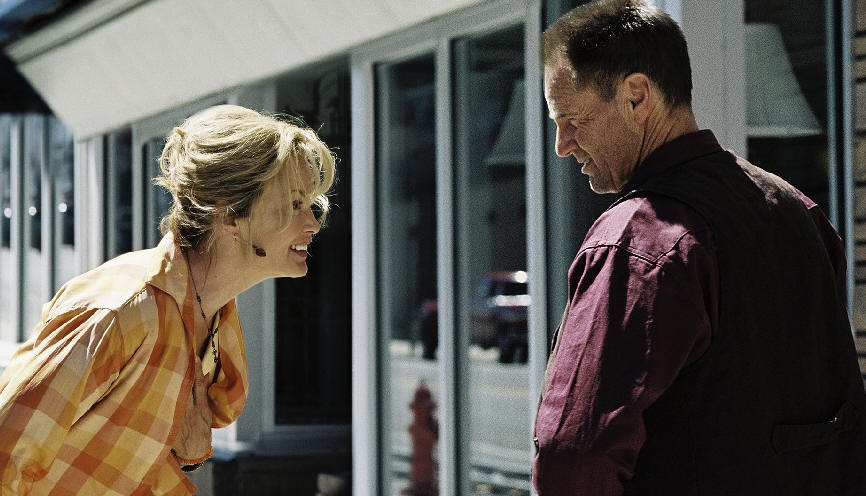 While making
Frances, Lange
co-starred with Sam Shepard – the Pulitzer Prize-winning playwright, who in
recent years had also blazed a trail as a handsome and acclaimed actor in
films like Days of Heaven and Resurrection. The two have been
a couple ever since – one of the longest and most devoted relationships in
modern Hollywood.
While making
Frances, Lange
co-starred with Sam Shepard – the Pulitzer Prize-winning playwright, who in
recent years had also blazed a trail as a handsome and acclaimed actor in
films like Days of Heaven and Resurrection. The two have been
a couple ever since – one of the longest and most devoted relationships in
modern Hollywood.
Lange and Shepard had worked together on several projects in the 80s. After
Frances,
they starred together in Country and Crimes of the Heart. The last
time they worked together was when Shepard directed Lange in the 1988 drama
Far North.
That
is until now. Lange is co-starring with Shepard in Don’t Come Knocking –
a film that was also written by Shepard as his reunion with acclaimed
German director Wim Wenders (Wings of Desire, The End of Violence.)
Shepard and Wenders had also not worked together in two decades; they were
the creative team behind the legendary indie film
Paris, Texas with
Harry Dean Stanton.
“Wim and Sam
started talking about it – must be close on four years ago when they came up
with the story and started writing,” Lange recalls. “I was aware that they
were working on this. I was aware for a long time that they were writing a
part that they wanted me to do. But, until the script was finished I didn’t
see it.”
However, when the film was originally planned to be made, Lange could not
work it into her schedule.
“Not
only could she not fit it into her schedule,” explains director Wenders, “it
was out of the question. Because both of their kids were in high school. The
deal with Sam and Jessica was ever since they married and had kids one of
them stayed home. Sam is a dedicated father. He never worked when Jessica
was working. So although Sam respected my idea, he said well, fat chance. I
don’t think Jessica is going to accept it, because the kids were still in
school. Finally, the good thing about in this case having to push [it back]
twice [due to financing problems] – from 2002 to 2003 and then to 2004 – was
that when we were finally able to make the film, finally I had my dream
cast. 2004 was the first year that the two of them could consider being
onscreen together. The moment Sam knew that Jessica actually [would] be able
to play it; he re-wrote each and every line for her. He went through the
entire script and re-wrote every line of dialogue.”
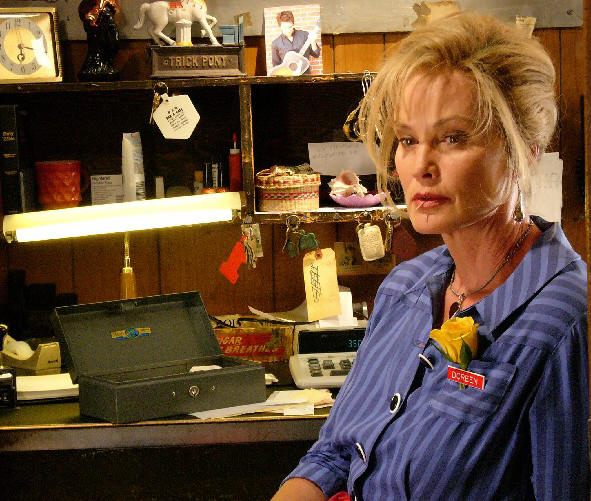 It
had been almost two decades since they worked together, but it was
comfortable right away.
It
had been almost two decades since they worked together, but it was
comfortable right away.
“It
was real easy working with him,” Lange says, smiling. “In a way, because
these two characters, even though they hadn’t seen each other for twenty
years, [they] had this shared experience, this life together. I just found
it real easy working with Sam.”
Don’t Come Knocking
is a quirky and fascinating character study in
the vein of
Paris,
Texas –
informed by Shepard's sharp ear for dialogue and Wender's idiosyncratic and
beautiful eye for visual splendor. In it, Shepard plays Howard Spence; an
aging has-been movie star who decides has squandered his life on drink,
young girls and bad movies. One day, while filming his latest Western
potboiler in Arches National Park in Moab, Howard hits his breaking point
and runs away from his life. While the filmmakers (cameo appearances by Tim
Matheson, Julia Sweeney and George Kennedy) hire a bounty hunter (Tim Roth)
to find their erstwhile star.
Howard
ends up going back home – or close to home anyway, visiting Elko, Nevada to
see his mother for the first time in almost thirty years. The mother is
played with charming nuance and understanding by Eva Marie Saint.
“My
one big regret in the film was that there were no scenes that I could play
with Eva Marie Saint,” Lange says. “I asked for it. I hounded them. I said
figure out some way, I just want to play a scene with this woman. But there
was no way to make it work.”
Howard’s
mother cares for her son and tries to help him come to terms with himself.
She also reveals a secret; years ago, when Howard was working on his
breakthrough role, he got a local girl pregnant. Now, he is the father of a
grown son he never knew existed.
Howard
decides that maybe he can get his life back on track if he finds them –
mends fences with the woman that got away and meets his child. He goes back
to Butte, Montana, looking to perhaps find a life that he was too busy and
self-centered to explore. It is easy enough to find them – Doreen still
works at the same diner (though, she proudly points out, she manages it now)
and his son Earl is the singer at the local bar.
However,
Howard finds his reunions to be different than he had pictured. Doreen seems
wary to see him. Earl is outright hostile towards the man. When a mysterious
girl (Sarah Polley) who seems to think Howard is also her father appears,
things get even more complicated.
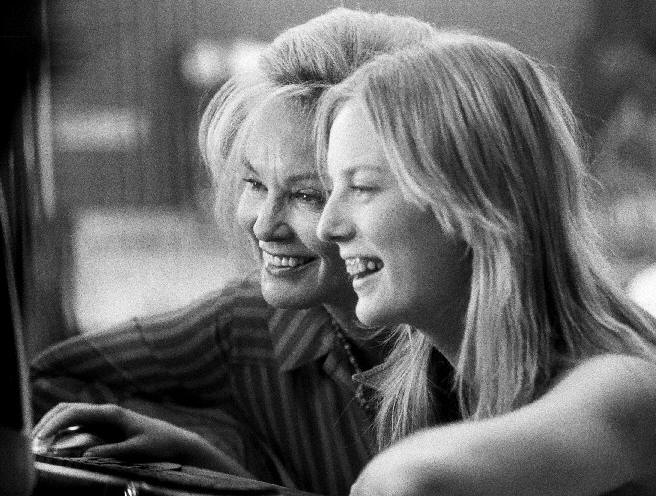 “I
think he’s just desperate,” Lange laughs. “I don’t think he’s really
thinking about her. This is a lost man, you know? I mean he goes to see his
mother. He goes back to his mother. Then she tells him he’s got a
child somewhere. It’s that kind of clutching at straws, don’t you think?
When he goes back there, I don’t think he has any intention of making a home
with her or anything. It’s just; he’s a lost, lost soul.”
“I
think he’s just desperate,” Lange laughs. “I don’t think he’s really
thinking about her. This is a lost man, you know? I mean he goes to see his
mother. He goes back to his mother. Then she tells him he’s got a
child somewhere. It’s that kind of clutching at straws, don’t you think?
When he goes back there, I don’t think he has any intention of making a home
with her or anything. It’s just; he’s a lost, lost soul.”
Lange had known Wenders through his long friendship and association with
Shepard, but they had never worked together before. Still, Wenders trusted
his leading lady to capture the feel of the story and the pulse of Doreen –
the waitress who ended up never leaving the small rundown town and diner.
“He
never really told me what his intentions were. I knew the script. I knew how
he was shooting it. I knew visually what Wim is attracted to – kind of that
Hopper-esque look, that desolation and loneliness. It wasn’t by chance he
set this in Butte. It was a very deliberate look that he wanted. Just
knowing the script and knowing Sam’s writing I guess it just kind of made
itself evident.
“Look, she’s a small town girl working in a café in Butte, Montana and a
movie star comes to town,” she continues. “You know, it’s one of those
location romances. He sweeps her off her feet. She kind of just falls crazy
in love with him. Then he disappears.”
Doreen may not have left her home town or
her job, but her life did go forward in all this time.
“I
don’t think she was waiting for him, but I think her heart was broken,”
Lange says.
“I think there was a moment where she just kind of stopped in time. She’s
still working in the restaurant. There was all
that going on and yet she found a way to go on without any kind of
bitterness or anger in her life. I really kind of liked the way that this
character was drawn, that she was just getting along. There was no real
anger at him. She didn’t let it ruin her life. I think there was a choice of
not living her life as an angry woman or… So in that way, when the explosion
does come, it really is about her son rather than about her.”
The
son was played by young actor Gabriel Mann (The Bourne Identity, The Life
of David Gale) who was thrilled to be part of such a talented troupe.
He’d long been a fan of Wenders and Shepard’s work. He found working with
Lange a very comfortable experience.
“The
thing about working with an actor like that is it’s easy,” Mann says about
Lange. “It doesn’t matter what you have to play. Because, I just have to
look at her. Looking at her face is like watching clouds move across the
sky. So you just watch it happening and you hopefully keep yourself open to
what’s coming from her. And there you are…”
The
story does not mirror Shepard’s own life as an aging actor, though, says
Lange. It is not autobiographical at all. “No, but it certainly is in his
realm of fathers and sons that he always writes about,” she says. “Although
in this case it’s the father looking for the son – usually it’s the other
way around. But no, not the particulars of this character.”
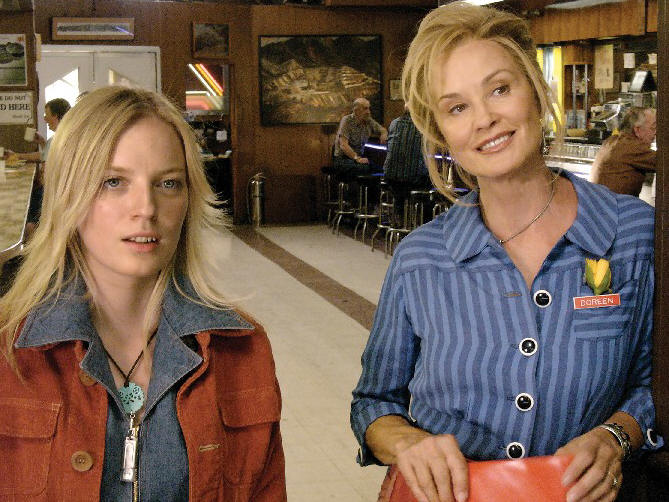 Being involved with one of the great playwrights of the 20th
Century would seem to be a fascinating ringside seat to the creative
process, though Lange acknowledges that she is kept somewhat out of the loop
in Shepard’s writing when it is still a work in progress.
Being involved with one of the great playwrights of the 20th
Century would seem to be a fascinating ringside seat to the creative
process, though Lange acknowledges that she is kept somewhat out of the loop
in Shepard’s writing when it is still a work in progress.
“[I
don’t see it] when he’s writing,” Lange admits. “But when we start playing
it, yeah, then, obviously… Sam is very private about [his work]… in fact,
he’s writing a play now and he’s probably about halfway through, but he
won’t even tell me what it’s about yet.”
Lange also treasured the chance to finally get to work with Wenders, whom
she had only met socially before. “I’d known Wim over the years, too, but
not well. Obviously not like Sam does. They have had a relationship for 25
years, going back way before
Paris, Texas,
actually. But it was a very comfortable feeling. It was a great group
of actors. Wim creates a wonderful milieu to work in. It’s a very
comfortable set. So it was a pleasure.
“He
really is a poet in a way,” she says. “He has a kind of approach to things
that is so outside the ordinary. It’s visually – I mean, I think Wings of
Desire, that whole movie to me was like a long poem. It was so visually
beautiful and so strange and kind of unsettling. The thing with Wim – and I
think it’s because he came to filmmaking from painting, and if you look at
his books on photography – is that he has such an extraordinary visual
approach. And yet, he’s very good with actors. I think the cast that he put
together for this film… I look at the acting and everyone is perfect in
their part, you know? It was beautifully played by this group of actors.”
Features
Return to the features page
